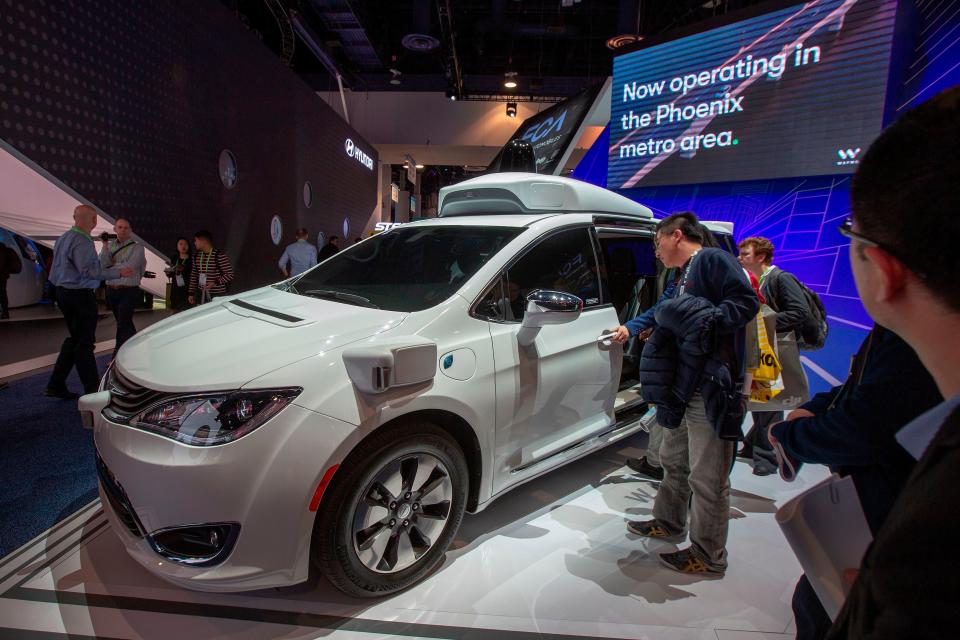Michigan lands former Google car project Waymo's self-driving car factory
Waymo says it plans to locate self-driving car manufacturing at a factory in southeast Michigan.
The company, which was formerly known as Google's driverless car project and is part of the same parent entity, said it expects to create hundreds of jobs in the process.
"We’ll be looking for engineers, operations experts and fleet coordinators to join our team and help assemble and deploy our self-driving cars," the company said in a statement.
A state economic development agency authorized a package of incentives for the project, pegged to the creation of at least 100 jobs with the potential for 400 total positions and a capital investment of up to $13.6 million.
"The company is looking for up to 200,000 square feet of ready-to-go, light manufacturing facility space to support its capacity expansion plans," the memo said.
Waymo already has a facility with about 20 employees in the Novi, Michigan, area and has a partnership with Fiat Chrysler Automobiles to provide Chrysler Pacifica minivans for its self-driving fleet.

It is also partnering with auto supplier Magna, which specializes in contract vehicle manufacturing.
Spokeswoman Alexis Georgeson said Waymo plans to move into its new space by the middle of 2019, and that the company is not abandoning its current Fiat Chrysler partnership.
"The Great Lakes State is one we already know and love, with a talented workforce and excellent snowy conditions for our cars to test. Our local engineers are already hard at work outfitting our Chrysler Pacifica hybrid minivans with Waymo technology, and now we’re looking forward to expanding our roots," the company said.
With General Motors' expected closure of the Detroit-Hamtramck Assembly plant this year, an extra 4.1 million square feet of manufacturing space could be available, although that footprint exceeds what Waymo said it is seeking.
Brian Rothenberg, a spokesman for the United Auto Workers union, was asked for a comment on the possibility that Detroit-Hamtramck might be suitable or if it's something the union would support.
“Our focus is to leave no stone unturned to keep the Hamtramck plant open,” Rothenberg said.
GM spokesman Pat Morrissey was also asked for comment, but he said that “any discussion on the status of the plant beyond the build-out of the current products is a matter discussed in UAW-GM negotiations.”
Automakers and tech companies have committed billions of dollars in hopes of gaining advantage in the race to develop self-driving vehicles. Proponents say the technology will transform transportation by reducing traffic crashes and providing new mobility options.
Critics warn, however, that its abilities to date have been oversold. Even John Krafcik, Waymo's CEO, has noted that the technology has a ways to go.
The current announcement, however, reinforces the point of view that Michigan is a great region for the next phase of mobility. For one, Krafcik, whose previous jobs included roles at Ford and Hyundai, is familiar with Michigan’s automotive industry and "the ecosystem here,” said Ellen Hughes-Cromwick, associate director for the University of Michigan Energy Institute. For this reason, Waymo knows the importance of taking advantage of the assets and people in Michigan as the world transitions to robot cars.
Also, to build electric cars -- experts say self-driving vehicles are most likely to be electric or hybrids -- requires a smaller plant footprint compared to the space needed to build a gasoline vehicle, meaning a self-driving car company such as Waymo can “invest in people and capital here at a cost-effective rate.”
Finally, the idea that Silicon Valley is the center of the technology world is changing, some experts say. In fact, Michigan has plenty of technology and autonomous development already popping up. Take Rivian, the Michigan-based startup Rivian plans to launch an all-electric pickup. Last year, Rivian bought an old Mitsubishi plant in central Illinois to build the pickups.
“We can make Michigan a living laboratory as we evolve to this new mobility,” Hughes-Cromwick said. “If you think all of this will go to California, that is an (expensive) home base for this stuff.”
She said it is critical that Michigan leaders “seize the opportunity” to get investment dollars flowing to the region.
Follow Detroit Free Press reporter Eric D. Lawrence on Twitter: @_ericdlawrence. Free Press staff writer Todd Spangler contributed to this report.
This article originally appeared on Detroit Free Press: Michigan lands former Google car project Waymo's self-driving car factory

